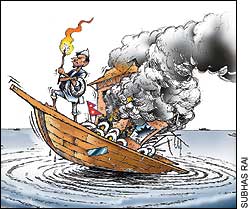 The deep-seated animosity between Nepali politicians and Kathmandu's social elite is rooted in history. Ever since the Rana days, politics has always been synonymous with court conspiracies, and the well-off have considered it beneath their dignity.
The deep-seated animosity between Nepali politicians and Kathmandu's social elite is rooted in history. Ever since the Rana days, politics has always been synonymous with court conspiracies, and the well-off have considered it beneath their dignity. King Mahendra found politicians not to his liking and punished them in 1960 by putting them behind bars, dissolving parliament, suspending the constitution and banning political parties.
By the time King Birendra ascended the throne in 1972, political alignment of any kind had come to be regarded as disloyal to the ruler and the country, in that order. At the height of the "non-party" Panchayat system in the seventies, the palace establishment labelled all political leaders "anti-national elements" and prosecuted them for high treason. So the true-blue elite and the career-minded steered clear of politics. Even when King Birendra called for a National Referendum to decide the fate of Panchayat in 1979, the ban on political parties wasn't lifted.
The Popular Movement ten years later forced King Birendra to accept the existence of political parties. The new constitution placed multiparty democracy in its preamble, and beyond the purview of any amendment. The upper crust was finally forced to accept that the political parties existed. But even then, there hasn't been much love lost between them.
Post 10-04, these old animosities have resurfaced. Cursing political parties has once again become fashionable, and few see the need to examine their own roles in the decomposition of democracy. All they need to do in order to be a part of the "with-it set" is blame politicos for all ills besetting society. There is a chilly sense of d?j? vu in the Kathmandu air this winter for those who remember 1961.
In his Biratnagar address, King Gyanendra recognised that a monarchy of the 21st century has to be for democracy, and not against it. The very existence of unity in a heterogeneous society is dependent upon the practice of democracy, and no ruler can inhibit pluralism without undermining his own legitimacy in the process.
In heterogeneous societies like ours the role of political parties is even more crucial-they have to offset latent tensions by acting as miniature states themselves. The absence of vibrant political parties leads to democratic decay and even the collapse of fragile states. For Marxist thinker Antonia Gramsci, Machiavelli's prince in the contemporary world is a political party with all its strength and vulnerabilities.
Why, then, does the Nepali elite still loath political parties? The revulsion is not based on principles, but on practical considerations. For one, political parties have their own loyalty and patronage network and have no place for those who don't want to get their hands dirty. Second, party leaders do not respect dress codes, know zilch about social niceties, and end up antagonising the social elite steeped in the tradition of court manners. Third, and perhaps the most important, all political parties are perennially engaged in managing their own internal contradictions, a preoccupation that puts off disciplinarian elites.
And then, it is in the nature of half-made societies that the elite periodically yearns for a knight in shining armour. This is a common dream of the oppressor and oppressed alike in all collectives with a wounded psyche. When political parties fail to raise hopes, even sensible people start looking for a saviour.
Neo-populist strongmen who have no patience for democratic institutions bank on this when they try to sideline political parties. In the public realm, civil society is effective enough in "protest-making" to check misuse of the law by those in power. But when it comes to "claim-making"-demanding that laws be made based on certain universal values-there is yet no alternative to political parties. An independent politician is therefore an oxymoron, for there can be no politics without adherence to certain shared values.
Party building is therefore the equivalent of nation-building. It is a complex task that requires unwavering commitment, patience, persistence, courage, compassion and a willingness to make compromises without sacrificing any of the fundamental values of the collective. Organised society can't escape from the compulsion of putting up with politicians. So, go join a party today. Better still, start your own.



